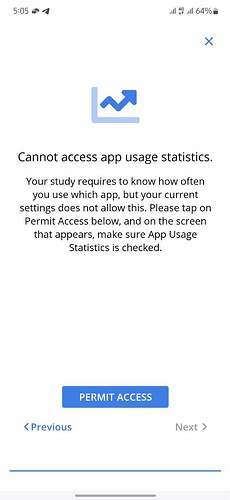Supported on Android.
This data source records how often participants use which app. The captured data does not include any content of the application.
Use Cases
- Mental health research: Analyzing app usage patterns to understand the relationship between screen time, social media use, and mental health outcomes
- Physical activity and sedentary behavior: Measuring sedentary time and linking prolonged app use to a lack of physical activity and its health consequences
- Sleep research: Investigating how screen time affects sleep hygiene and quality
- Cognitive and behavioral science: Gaining insights into a user’s daily routines, multitasking habits, and reliance on specific apps to understand cognitive load and behavioral tendencies
Data Structure
Besides the common data fields, each record contains:
- App Name: The user-friendly name of the app. Internally stored as
app_name. - App Package Name: The unique bundle identifier of the app. Internally stored as
app_package_name. - App Version: The version of the app being used. Internally stored as
app_version. - Start Time: The timestamp of when the app entered the foreground. Internally stored as
start_time. - End Time: The timestamp of when the app left the foreground. Internally stored as
end_time. - Duration: The amount of time, in seconds, rounded down to the nearest second, that the app was in the foreground. Internally stored as
duration.
Adding App Usage As a Data Source
See Adding Data Sources.
Data Collection Behavior
The App Usage data source collects data for all apps that run in the foreground on the participant’s Android device. Data collection starts automatically when the participant grants the necessary permissions and continues as long as the app is running and has the required permissions.
Monitoring and Exporting App Usage Data
There are two ways to monitor and export App Usage data: using the Data Export page and using Kibana.
App Usage Data Source in the Participant App
After a participant joins a study, they need to grant access to Avicenna to collect app usage data. To do that, the participant needs to open the onboarding alert in the Avicenna app to complete the study setup. They will see the following page:
On this page, the participant needs to click on the PERMIT ACCESS button and follow the instructions to grant Avicenna access to collect app usage data.
[!note]
The participant can stop sharing the data anytime by going to theSettingsof their device.
